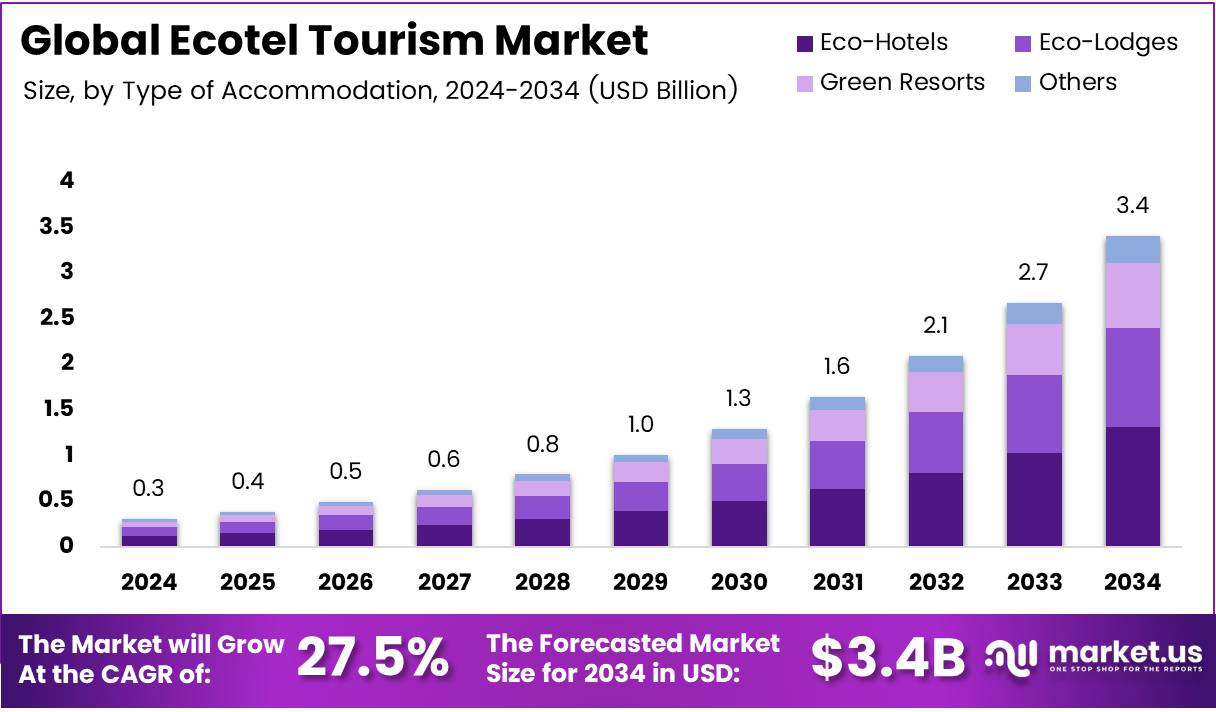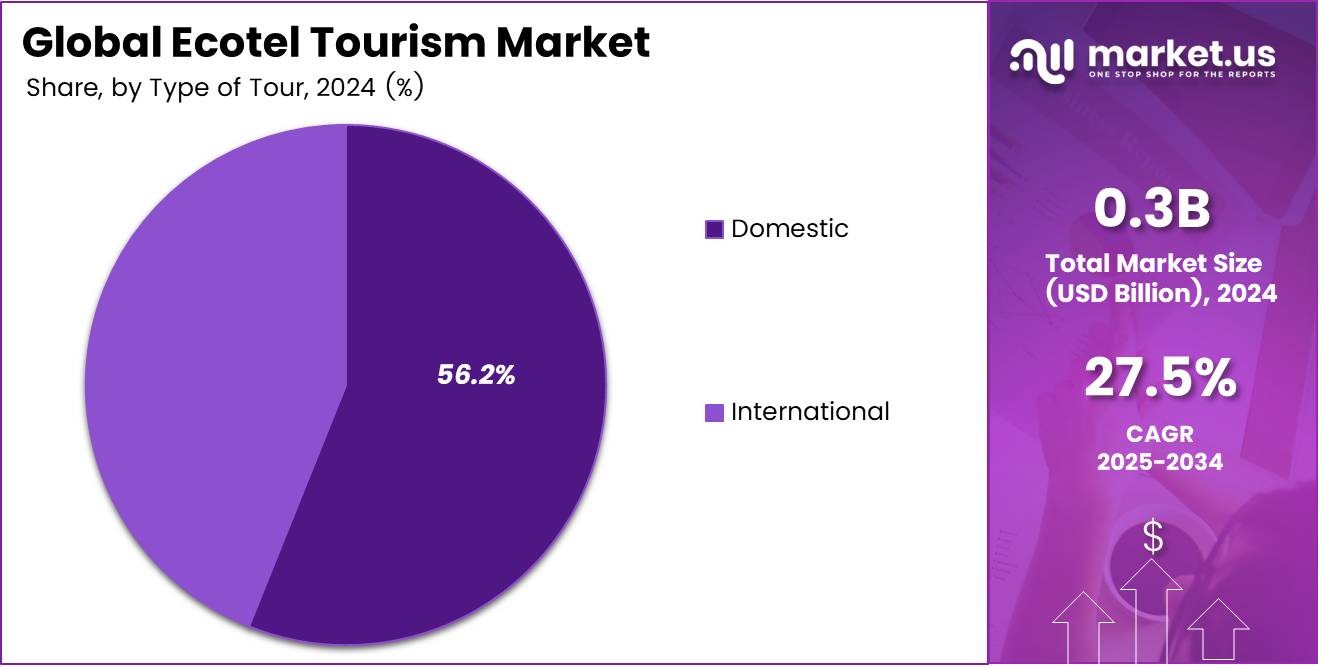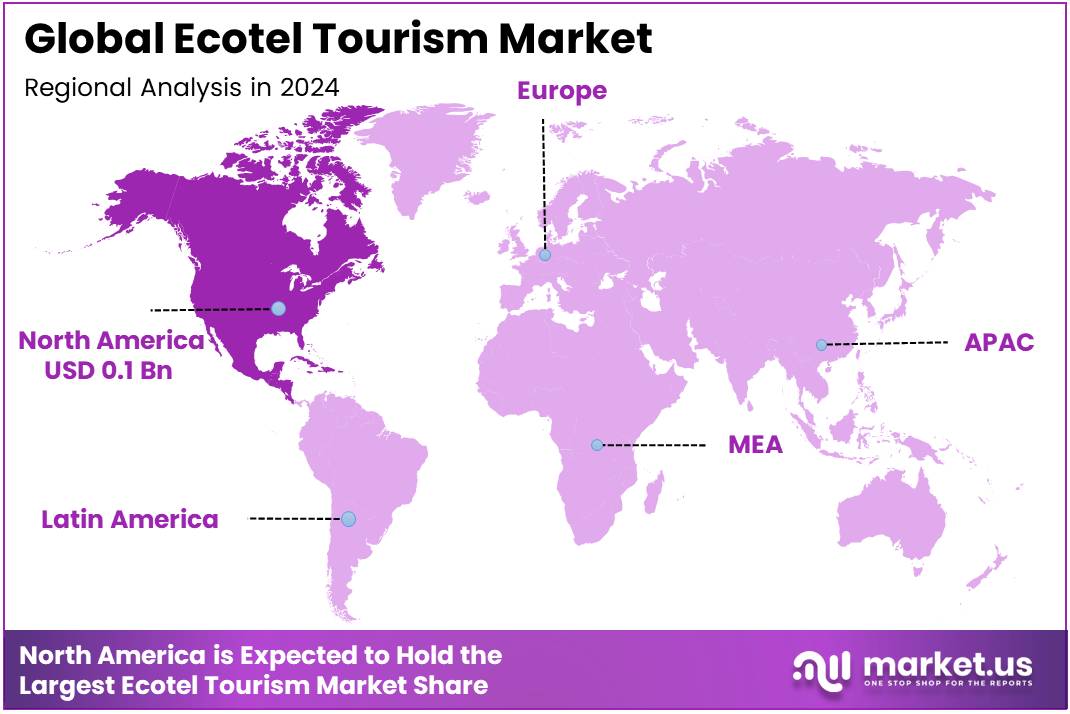Global Ecotel Tourism Market Size, Share, Growth Analysis By Type of Accommodation (Eco-Hotels, Eco-Lodges, Green Resorts, Others), By Destination Type (Coastal Escapes, Rainforest Retreats, Mountain Sanctuaries, Urban Eco-Hotels), By Type of Traveler (Adventure Travelers, Business Travelers, Family Travelers, Leisure Travelers, Others), By Type of Tour (Domestic, International), By Region and Companies - Industry Segment Outlook, Market Assessment, Competition Scenario, Statistics, Trends and Forecast 2025-2034
- Published date: Jul 2025
- Report ID: 154090
- Number of Pages: 208
- Format:
-
keyboard_arrow_up
Quick Navigation
Report Overview
The Global Ecotel Tourism Market size is expected to be worth around USD 3.4 Billion by 2034, from USD 0.3 Billion in 2024, growing at a CAGR of 27.5% during the forecast period from 2025 to 2034.
Ecotel tourism, often referred to as eco-friendly or sustainable tourism, is a growing segment in the global travel industry. This market focuses on environmentally conscious travel practices and accommodations designed to minimize their ecological impact. With increasing awareness about climate change and environmental degradation, Ecotel tourism has attracted attention from travelers, businesses, and governments alike.

The growth of the Ecotel tourism market is largely driven by changing consumer preferences. More travelers are seeking experiences that allow them to enjoy nature while contributing to its preservation. This shift in attitudes creates opportunities for tourism operators to offer greener alternatives, from energy-efficient hotels to eco-conscious transportation options. As sustainability becomes more important to travelers, the demand for eco-friendly destinations continues to rise.
Governments across the world are recognizing the potential of Ecotel tourism and are making significant investments to promote sustainable practices in the travel industry. Public policies, incentives, and subsidies are being introduced to encourage businesses to adopt green technologies. These efforts aim to reduce the carbon footprint of tourism activities and foster a more sustainable future for the industry. With such backing, the Ecotel tourism market is poised for growth and long-term success.
Regulatory frameworks are also evolving to support the development of Ecotel tourism. Governments are enforcing stricter environmental regulations, such as energy efficiency standards and waste management protocols, to ensure that tourism providers adhere to sustainable practices. These regulations not only help preserve the environment but also create a level playing field for businesses committed to sustainability.
According to a survey by The Harris Poll for TIME, 56% of Americans consider the environmental impact of their vacations at least somewhat important. However, only 17% are willing to pay more for eco-friendly options, and just 12% have adjusted their travel plans due to environmental concerns. This highlights the market’s potential despite challenges in consumer willingness to pay a premium.
Furthermore, a survey indicates that nearly 45% of global travelers consider traveling sustainably important, though it may not always be their top priority when booking a trip. This underscores the importance of offering eco-friendly options that align with travelers’ growing desire to make environmentally responsible choices. With the right marketing and product offerings, Ecotel tourism can expand to meet this demand.
Key Takeaways
- The Global Ecotel Tourism Market is projected to reach USD 3.4 Billion by 2034, growing at a CAGR of 27.5% from 2025 to 2034.
- Eco-Hotels led the By Type of Accommodation segment in 2024, capturing 38.5% of the market share.
- Coastal Escapes dominated the By Destination Type segment with a 33.6% share in 2024.
- Adventure Travelers led the By Type of Traveler segment, securing 32.9% of the market share in 2024.
- Domestic tours accounted for the largest share of the Ecotel Tourism Market in 2024, with 56.2%.
- North America led the Ecotel Tourism Market in 2024, holding 43.1% of the market share, valued at USD 0.1 Billion.
Type of Accommodation Analysis
In 2024, Eco-Hotels held a dominant market position in By Type of Accommodation Analysis segment of Ecotel Tourism Market, with a 38.5% share.
In 2024, Eco-Hotels led the By Type of Accommodation segment of the Ecotel Tourism Market, securing a significant 38.5% market share. Their growth is attributed to an increasing preference for sustainable and eco-friendly stays among environmentally conscious travelers. This type of accommodation continues to gain popularity as travelers become more aware of their environmental footprint.
Eco-Lodges followed closely behind, catering to nature lovers and eco-conscious visitors, offering a closer-to-nature experience. Green Resorts also gained traction, attracting affluent travelers seeking luxury combined with sustainability. The segment Others accounted for a smaller share but remained relevant for unique and niche eco-friendly accommodations.
The increasing focus on eco-tourism and the demand for environmentally responsible travel options have been key drivers behind the growth of Eco-Hotels and related segments.
Destination Type Analysis
In 2024, Coastal Escapes held a dominant market position in By Destination Type Analysis segment of Ecotel Tourism Market, with a 33.6% share.
Coastal Escapes took the lead in the By Destination Type analysis, with a 33.6% share of the Ecotel Tourism Market in 2024. Their appeal lies in the serene and relaxing environments they offer, which align well with the rising demand for sustainable, beachside retreats. As travelers increasingly seek destinations that combine natural beauty with eco-friendly accommodations, coastal destinations have become a prime choice.
Rainforest Retreats also experienced significant growth due to their immersive natural experiences, while Mountain Sanctuaries provided an alternative for eco-tourists seeking remote and quiet retreats. Urban Eco-Hotels, though a smaller segment, continued to expand due to growing demand for sustainable accommodations within city environments.
Type of Traveler Analysis
In 2024, Adventure Travelers held a dominant market position in By Type of Traveler Analysis segment of Ecotel Tourism Market, with a 32.9% share.
Adventure Travelers led the By Type of Traveler segment, capturing a 32.9% market share in 2024. This growth was driven by the rising interest in eco-tourism activities that offer outdoor adventures like hiking, trekking, and wildlife safaris. Adventure travelers are particularly attracted to destinations that offer sustainability alongside excitement and challenge.
Business Travelers also maintained a notable share, seeking eco-friendly accommodations that cater to both sustainability and convenience. Family Travelers followed, with eco-conscious families choosing destinations that provide environmental education alongside relaxation. Leisure Travelers and other types of travelers made up the remainder of the segment, showing that sustainability is a factor across all traveler types.
Type of Tour Analysis
In 2024, Domestic held a dominant market position in By Type of Tour Analysis segment of Ecotel Tourism Market, with a 56.2% share.
Domestic tours dominated the Ecotel Tourism Market in 2024, with a 56.2% market share. This growth can be attributed to the increasing interest in local and sustainable travel options, especially as travelers became more aware of the environmental impact of international travel. The demand for domestic eco-tourism is further fueled by the accessibility and affordability of local destinations.
International travel also played a significant role, but its share remained smaller compared to domestic travel. Travelers seeking international eco-tourism experiences continue to prefer destinations that prioritize environmental sustainability. Both domestic and international tours are projected to grow as eco-conscious travelers continue to look for options that align with their values.

Key Market Segments
By Type of Accommodation
- Eco-Hotels
- Eco-Lodges
- Green Resorts
- Others
By Destination Type
- Coastal Escapes
- Rainforest Retreats
- Mountain Sanctuaries
- Urban Eco-Hotels
By Type of Traveler
- Adventure Travelers
- Business Travelers
- Family Travelers
- Leisure Travelers
- Others
By Type of Tour
- Domestic
- International
Drivers
Rising Consumer Preference for Sustainable Tourism Drives Ecotel Tourism Market Growth
The growing consumer interest in sustainable tourism has significantly boosted the ecotel tourism market. More travelers are opting for eco-friendly vacation options that minimize their environmental impact. This shift in preference is leading to a higher demand for accommodations that offer sustainable practices, such as energy-saving technologies and waste reduction.
The demand for eco-friendly accommodations has become more prominent, as consumers seek out places that align with their environmental values. Hotels and resorts that incorporate green technologies, like solar panels and water-saving systems, are gaining popularity. This trend reflects the broader consumer drive towards more responsible and conscious travel choices.
In addition, renewable energy technologies are becoming more widespread in the hospitality industry. With increasing awareness about environmental sustainability, many ecotels are adopting clean energy sources like wind, solar, and geothermal energy. This not only helps to reduce carbon footprints but also enhances the appeal of these accommodations to eco-conscious travelers.
Restraints
Regulatory Challenges and Limited Availability of Certified Eco-Friendly Accommodations Restrain Ecotel Tourism Market Growth
Despite the growth of the ecotel tourism market, there are notable restraints. Regulatory challenges and compliance requirements pose significant barriers to the expansion of eco-friendly accommodations. Strict guidelines regarding environmental certification and the cost of meeting these standards can deter many hospitality providers from adopting sustainable practices.
Additionally, the availability of certified eco-friendly accommodations remains limited. While the demand for sustainable travel options is rising, there are still not enough accommodations that meet the necessary environmental standards. This scarcity can make it difficult for travelers to find eco-friendly lodging options, limiting the overall growth potential of the ecotel tourism market.
Growth Factors
Growth Opportunities in the Ecotel Tourism Market
The ecotel tourism market holds several growth opportunities. The expansion of ecotourism destinations in emerging markets presents a promising avenue. As more regions around the world recognize the economic and environmental benefits of sustainable tourism, new eco-friendly destinations are being developed to attract environmentally conscious travelers.
The integration of smart technologies in eco-friendly accommodations is another growth opportunity. Innovations such as energy-efficient systems, smart rooms, and digital tools to manage energy use can improve the guest experience while reducing the environmental impact of stays.
Partnerships between eco-friendly travel agencies and hospitality providers are also on the rise. These collaborations help promote sustainable tourism by offering integrated travel packages that focus on eco-friendly options.
Moreover, the development of sustainable transport options, such as electric vehicle rentals and carbon-offset initiatives, will complement eco-friendly accommodations and encourage travelers to adopt greener modes of transportation during their trips.
Emerging Trends
Trending Factors Shaping the Ecotel Tourism Market
Several trends are shaping the ecotel tourism market. Off-the-grid travel experiences have become increasingly popular, with travelers seeking destinations that offer complete immersion in nature while minimizing their environmental footprint. These experiences often include staying at remote, sustainable accommodations that use renewable energy and have minimal impact on the surrounding ecosystem.
The use of digital platforms for booking sustainable travel has also increased. Travelers are now using websites and apps that highlight eco-friendly options and provide transparent information about sustainability practices. This trend is making it easier for people to choose sustainable tourism options, supporting the growth of the ecotel market.
Additionally, there is a growing preference for nature-based experiences over traditional urban tourism. Many travelers are now prioritizing destinations that allow them to connect with nature, such as national parks, nature reserves, and eco-friendly resorts. This shift toward nature-focused tourism is further driving the demand for sustainable accommodations.
Regional Analysis
North America Dominates the Ecotel Tourism Market with a Market Share of 43.1%, Valued at USD 0.1 Billion
North America leads the global Ecotel Tourism Market with a significant market share of 43.1%, valued at USD 0.1 Billion. The region’s dominance can be attributed to its well-established tourism infrastructure, increasing consumer preference for eco-friendly travel options, and strong government support for sustainable tourism initiatives. The growing demand for green and sustainable accommodations has further fueled the region’s market growth.

Europe Ecotel Tourism Market Trends
Europe holds a prominent position in the Ecotel Tourism Market, driven by an increasing emphasis on sustainability and environmental conservation. Eco-conscious travelers across Europe have led to the rapid growth of ecotels, with countries like Germany, France, and Switzerland embracing eco-tourism practices. The region’s well-established eco-tourism policies and its diverse natural landscapes continue to make it a top destination for sustainable travel.
Asia Pacific Ecotel Tourism Market Trends
The Asia Pacific region is experiencing rapid growth in the Ecotel Tourism Market as an increasing number of travelers seek eco-friendly alternatives in destinations like India, China, and Japan. The market is driven by a shift towards sustainability and eco-consciousness, fueled by growing awareness of environmental issues. The region’s unique biodiversity and natural resources make it an attractive location for eco-tourism investments.
Middle East and Africa Ecotel Tourism Market Trends
The Middle East and Africa are showing a growing interest in the Ecotel Tourism Market, driven by the region’s expanding tourism sector. As sustainable travel becomes a priority, countries like the UAE, South Africa, and Morocco are incorporating eco-friendly initiatives within their tourism strategies. The market is still in its early stages but is expected to witness significant growth as regional governments focus on preserving natural environments.
Latin America Ecotel Tourism Market Trends
Latin America is gradually emerging as a key player in the Ecotel Tourism Market. Countries such as Brazil, Costa Rica, and Peru are investing in sustainable travel initiatives, positioning themselves as eco-friendly destinations. The region’s rich natural landscapes, including the Amazon rainforest, create ample opportunities for the growth of ecotel tourism as travelers increasingly seek eco-tourism experiences.
Key Regions and Countries
North America
- US
- Canada
Europe
- Germany
- France
- The UK
- Spain
- Italy
- Rest of Europe
Asia Pacific
- China
- Japan
- South Korea
- India
- Australia
- Rest of APAC
Latin America
- Brazil
- Mexico
- Rest of Latin America
Middle East & Africa
- GCC
- South Africa
- Rest of MEA
Key Ecotel Tourism Company Insights
In 2024, the global ecotel tourism market witnessed significant strides in sustainability, with leading players enhancing their eco-friendly initiatives.
Accor Group has been at the forefront of sustainable hospitality, achieving a milestone by eco-certifying its 1,000th hotel in June 2024. The group aims for 100% eco-certification across its network by 2026, demonstrating a strong commitment to environmental stewardship.
El Nido Resorts in the Philippines continues to set benchmarks in eco-luxury tourism. Their resorts, such as Miniloc and Pangulasian, integrate renewable energy sources, rainwater harvesting, and sustainable food sourcing, ensuring minimal environmental impact while offering guests immersive nature experiences.
Jetwing Surf in Sri Lanka exemplifies a harmonious blend of luxury and sustainability. Located in Pottuvil Point, the resort is designed using natural materials and emphasizes local sourcing and waste reduction, providing guests with an authentic and eco-conscious beachfront experience.
Six Senses Hotels has solidified its position as a leader in sustainable luxury. With all properties achieving GSTC certification by December 2024, Six Senses focuses on reducing environmental footprints and enhancing biodiversity through initiatives like coral reef restoration and habitat conservation.
These industry leaders are not only enhancing their brand value but also shaping the future of sustainable tourism through innovative practices and unwavering commitment to environmental preservation.
Top Key Players in the Market
- Hotel Groups
- Accor Group
- El Nido Resorts
- Jetwing Surf
- Six Senses Hotels
- Marriott International
- Radisson Hotel Group
- Hyatt Hotels Corporation
- Banyan Tree Hotels & Resorts
- Shangri-La Hotels and Resorts
- Hilton Worldwide
Recent Developments
- In June 2024, Yatra Online expanded its adventure tourism portfolio by acquiring ANN, a leading adventure travel company, further diversifying its offerings in the competitive tourism market.
- In June 2025, MMGY Global strengthened its market position with the acquisition of Think Strawberries, a prominent travel representation company in India and the GCC, enhancing its presence in these key regions.
- In October 2024, SAMHI Hotels expanded its footprint in Bengaluru through the acquisition of Innmar Tourism and Hotels, increasing its hotel portfolio in the region and bolstering its competitive advantage.
- In September 2024, EaseMyTrip ventured into the medical tourism sector with the acquisition of Pflege Home Healthcare & Rollins International, signaling its entry into the high-demand healthcare tourism market.
Report Scope
Report Features Description Market Value (2024) USD 0.3 Billion Forecast Revenue (2034) USD 3.4 Billion CAGR (2025-2034) 27.5% Base Year for Estimation 2024 Historic Period 2020-2023 Forecast Period 2025-2034 Report Coverage Revenue Forecast, Market Dynamics, Competitive Landscape, Recent Developments Segments Covered By Type of Accommodation (Eco-Hotels, Eco-Lodges, Green Resorts, Others), By Destination Type (Coastal Escapes, Rainforest Retreats, Mountain Sanctuaries, Urban Eco-Hotels), By Type of Traveler (Adventure Travelers, Business Travelers, Family Travelers, Leisure Travelers, Others), By Type of Tour (Domestic, International) Regional Analysis North America (US and Canada), Europe (Germany, France, The UK, Spain, Italy, and Rest of Europe), Asia Pacific (China, Japan, South Korea, India, Australia, and Rest of APAC), Latin America (Brazil, Mexico, and Rest of Latin America), Middle East & Africa (GCC, South Africa, and Rest of MEA) Competitive Landscape Accor Group, El Nido Resorts, Jetwing Surf, Six Senses Hotels, Marriott International, Radisson Hotel Group, Hyatt Hotels Corporation, Banyan Tree Hotels & Resorts, Shangri-La Hotels and Resorts, Hilton Worldwide Customization Scope Customization for segments, region/country-level will be provided. Moreover, additional customization can be done based on the requirements. Purchase Options We have three licenses to opt for: Single User License, Multi-User License (Up to 5 Users), Corporate Use License (Unlimited User and Printable PDF) 
-
-
- Hotel Groups
- Accor Group
- El Nido Resorts
- Jetwing Surf
- Six Senses Hotels
- Marriott International
- Radisson Hotel Group
- Hyatt Hotels Corporation
- Banyan Tree Hotels & Resorts
- Shangri-La Hotels and Resorts
- Hilton Worldwide










